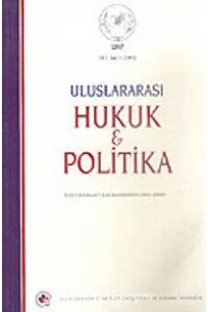Evaluation of the partnership and cooperation agreement between the European Union And Russia from the public diplomacy of perspective
Bu makale, Soğuk Savaş sonrası dönemde Avrupa Birliği ve Rusya arasındaki ilişkilerin temel dayanağını oluşturan Ortaklık ve İşbirliği Antlaşmasını Rus kamu diplomasisi açısından değerlendirmektedir. Bu çalışmada, Avrupa Birliği ile Rusya arasındaki ilişkilerin hukuki, kurumsal ve siyasi çerçevesini oluşturan Ortaklık ve İşbirliği Antlaşması çeşitli yönleriyle ele alınmıştır. Aynı zamanda stratejik bir ortaklık kurma söylemleri de farklı boyutlarıyla incelenmiştir. Avrupa Birliği ve Rusya arasındaki ilişkilerin gelişmesine yönelik mekanizmalara sahip olmasından dolayı Ortaklık ve İşbirliği Antlaşmasının değerlendirilmesi tercih edilmiştir. Ortaklık ve İşbirliği Antlaşması'nın en hassas ve kırılgan alanını oluşturan siyasi ortaklığın, belgelerde yazıldığı gibi uygulanmadığı ve söylemde kaldığı tespit edilmiştir. Yani Rusya ve Avrupa Birliği ilişkileri, bazı problemli siyasi konulardan dolayı, belgelerde amaçlandığı ve söylendiği gibi başarıya ulaşamamıştır.
Rusya ile Avrupa birliği arasındaki ortaklık ve işbirliği antlaşmasının Rus kamu diplomasisi perspektifinden değerlendirilmesi
This article evaluates the Partnership and Cooperation Agreement between the European Union and Russia from a Russian perspective of public diplomacy after the Cold War. Partnership and Cooperation Agreement is the legal basis for EU relations with Russia. It establishes the institutional and political frameworks for bilateral relations, sets the principal common objectives, calls for activities and dialogue in a number of policy areas and provides an appropriate mechanism for political dialogue. This study discusses why the relationship between the European Union and Russia has not achieved its intended aims as indicated in the documents and what the leaders says. On the other side, Russia has shown this agreement as a success in terms of public diplomacy. It is also examined the current rhetoric of Europe and Russia to build a strategic partnership. Within the context of this article it is determined that the most sensitive and vulnerable area of cooperation in the framework of the Partnership and Cooperation Agreement (PCA) is the political partnership which has not realized as in the rules and the rhetoric in programmatic documents due to some trouble political issues.
___
- Allen, David and Smith, Michael, ‘The European Community in the New Europe: Bearing the Burden of Change’, International Journal, Vol.47, No.l, Winter 1991-2.
- Brusstar, James H., ‘Russian Vital Interests and Western Security’, Orbis, vol. 38, no. 3, Fall 1994.
- Delegation of the European Union to Russia, http://www.delrus.ec.europa.eu/en/p_210.htm
- EU-Russia Parliamentary Cooperation Committee, world wide website URL: http:// www. europarl. eu.int/meetdocs/delegations/russ/default. html
- European Parliament, ‘Oostlander Report for Common Strategy on Russia’, European Parliament 2000 Report on the implementation of the Common Strategy of the European Union on Russia (A5-0363/2000 final)
- Haas, Richard and O'Sullivan, Meghan ‘Terms of Engagement: Alternative to Punitive Policies’, Survival, vol. 42, no. 2, Summer 2000.
- Hatipoğlu, Esra, ‘EU-Russia: Partnership and Cooperation Agreement’, Marmara Journal of European Studies, vol. 5, no. 1-2, 1997.
- Henze, Paul B., ‘Russia and the Caucasus’, Perceptions Journal of International Affairs,vol. l, no. 2, June-August 1996.
- Hohmann, H., Meier, C., and Timmermann, H., ‘The European Community and the Countries of the CIS:Political and Economic Relations’, The Journal of Communist Studies, vol. 9, no. 3, September 1993.
- Jopp, Mathias and Lippert, Barbara, ‘Towards a Solution of the Baltic Issue: the EU’sRole’, in Mathias Jopp and Sven Arnswald (eds), The European Union and the Baltic States Visions, Interests and Strategies for the Baltic Sea Region, Program on the Northern Dimension of the CFSP, vol. 2, (Helsinki & Bonn:Ulkopoliittinen Instituutti& Institut für Europaische Politik,1998).
- Kanbolat, Hasan,‘RF'nin Güney Kafkasya'daki Askeri Varlığı ve Gürcistan Boyutu’, Stratejik Analiz, Cilt. l, No: 3 Temmuz 2000.
- Kamalov, İlyas, Putin Dönemi Rus Dış Politikası Moskova’nın Rövanşı, (İstanbul: Yeditepe Yayınları, 2008).
- Leshukov, Igor, ‘Can the Northern Dimension Break the Vicious Circle of Russia- EU Relations?’, in Hanna Ojanen (ed), The Northern Dimension: Fuel For the EU?, Program on the Northern Dimension of the CFSP, No.12, (Helsinki: The Finnish Institute of International Affairs, 2001).
- Mason, David S., Revolution in East-Cenral Europe: The Rise and Fall of Communism and the Cold War, (Boulder: Westview Press, 1992).
- Malcolm, Neil, ‘New Thinking and After: Debate in Moscow about Europe’ in Neil Malcolm(ed), Russia and Europe: An End To Confrontation, (New York: Pinter Publishers, 1994).
- Mikail, Elnur Hasan, KGB Albaylığından Devlet başkanlığına Putin Dönemi Rusya, (İstanbul: IQ Kültür Sanat Yayıncılık, 2008).
- Nauşabayeva, Asem, ‘Yeltsin'den Sonra Putin'le Yeni Rusya’, Stratejik Analiz, Cilt. l, No.1, Mayıs 2000.
- Neumann, Iver B., ‘The Geopolitics of Delineating 'Russia' and 'Europe': The Creation of 'the Other' in European and Russian Tradition’, in Tom Casier & Katlijn Malfliet (eds), Is Russia A European Power? The Position Of Russia in a New Europe, (Belgium:Leuven University Press, 1998).
- Neumann Iver B., Russia and the Idea of Europe: A Study in Identity and International Relations (1800-1994), (London: Routledge Publications, 1995).
- Onay, Yaşar, Rus Stratejisinin Mimarları, (İstanbul: İlgi Kültür Sanat Yayıncılık, Ocak 2008).
- Piper, Elizabeth , ‘Russia's Putin Pushes Lenin, Stalin Out In the Cold’, Reuters, Moscow,June 20, 2000.
- Poyraz, Emel, Avrupa Birliği’nin Tarihsel Gelişimi ve Türkiye, Marmara Üniversitesi Türkiyat Araştırmaları Enstitüsü Doktora tezi, 2009.
- Purtaş, Fırat, Rusya Federasyonu Ekseninde Bağımsız Devletler Topluluğu, (Ankara: Platin Yayınları, 2005).
- Sakwa, Richard, Russian Politics and Society, (London: Routh ledge, 1996).
- Timmermann, Heinz, ‘The EU, Russia and the War in Chechnya:What Is to be Done?’, European Foreign Affairs Review, vol. 5, no. 1, 2000.
- Unice Statement on Relations between Russia and the European Union, 13 June 1997.
- Zielonka, Jan, Explaining Euro-Paralysis: Why Europe is Unable to Act in International Politic, (London & New York: MacMillan Press, 1998).
- ISSN: 1305-5208
- Yayın Aralığı: Yılda 5 Sayı
- Başlangıç: 2018
- Yayıncı: Uluslararası Stratejik Araştırmalar Kurumu
